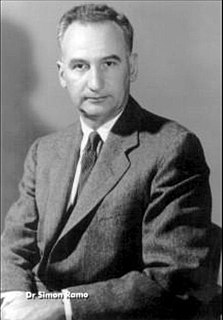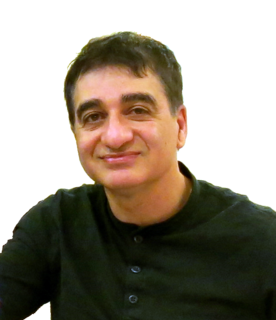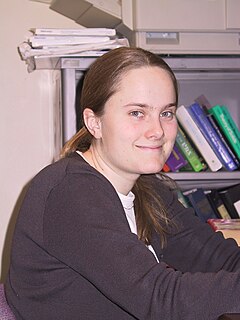Related Research Articles

Andrew James Viterbi is an American electrical engineer and businessman who co-founded Qualcomm Inc. and invented the Viterbi algorithm. He is the Presidential Chair Professor of Electrical Engineering at the University of Southern California's Viterbi School of Engineering, which was named in his honor in 2004 in recognition of his $52 million gift.

The USC Viterbi School of Engineering is the engineering school of the University of Southern California. It was renamed following a $52 million donation by Andrew J. Viterbi, co-founder of Qualcomm.

Simon "Si" Ramo was an American engineer, businessman, and author. He led development of microwave and missile technology and is sometimes known as the father of the intercontinental ballistic missile (ICBM). He also developed General Electric's electron microscope. He played prominent roles in the formation of two Fortune 500 companies, Ramo-Wooldridge and Bunker-Ramo.
Irving Stoy Reed was an American mathematician and engineer. He is best known for co-inventing a class of algebraic error-correcting and error-detecting codes known as Reed–Solomon codes in collaboration with Gustave Solomon. He also co-invented the Reed–Muller code.
Ming Hsieh is a billionaire Chinese-born American entrepreneur and philanthropist. He is the founder of Cogent Systems in 1990. In 2011, he founded Fulgent Genetics, a genetic testing technology company that provides comprehensive genetic testing solutions. According to Forbes magazine, his estimated net worth exceeds $1.6 billion, ranking him the 198th richest person in America and 562nd among The World's Richest People In 2006.

Chrysostomos Loizos "Max" Nikias is a Cypriot-American academic, and served as the 11th University of Southern California president, a position he held from August 3, 2010, to August 7, 2018. He holds the Malcolm R. Currie Chair in Technology and the Humanities and is president emeritus of the university. He had been at USC since 1991, as a professor, director of national research centers, dean, provost, and president. He also served as chair of the College Football Playoff (CFP) Board of Managers (2015-2018) as chair of the board of the Keck Medical Center at USC (2009-2018), as member of the board of directors of the Alfred Mann Institute for Biomedical Engineering (2001-2018), and as a member of the Board of Trustees of the Chadwick School, an independent school in Palos Verdes Peninsula, Calif. (2001-2010). He is currently a tenured professor in electrical engineering with a secondary appointment in classics, and the director of the USC Institute for Technology Enabled Higher Education.
The academics of the University of Southern California center on The College of Letters, Arts, and Sciences, the Graduate School, and its 17 professional schools.
Shang-Hua Teng is a Chinese-American computer scientist. He is the Seeley G. Mudd Professor of Computer Science and Mathematics at the University of Southern California. Previously, he was the chairman of the Computer Science Department at the Viterbi School of Engineering of the University of Southern California.

Yannis C. Yortsos is the Dean of the Viterbi School of Engineering at the University of Southern California. Since June 2005, he has served as Dean of the USC Viterbi School of Engineering and has held the Zohrab A. Kaprielian Chair in Engineering. He has also held the Chester F. Dolley Chair since January 1995. He was elected to the National Academy of Engineering in February 2008, where he has also served as secretary, vice-chair and chair of Section 11, and as the NAE Section 11 liaison to the National Research Council. Since July 2017, Yortsos serves as a member of the NAE Council.

Massoud Pedram is an Iranian American computer engineer noted for his research in green computing, energy storage systems, low-power electronics and design, electronic design automation and quantum computing. In the early 1990s, Pedram pioneered an approach to designing VLSI circuits that considered physical effects during logic synthesis. He named this approach layout-driven logic synthesis, which was subsequently called physical synthesis and incorporated into the standard EDA design flows. Pedram's early work on this subject became a significant prior art reference in a litigation between Synopsys Inc. and Magma Design Automation.
Chung-Chieh Jay Kuo is a Taiwanese electrical engineer and the director of the Multimedia Communications Lab as well as distinguished professor of electrical engineering and computer science at the University of Southern California. He is a specialist in multimedia signal processing, video coding, video quality assessment, machine learning and wireless communication.

Shrikanth Narayanan is an Indian-American Professor at the University of Southern California. He is an interdisciplinary engineer-scientist with a focus on human-centered signal processing and machine intelligence with speech and spoken language processing at its core. A prolific award-winning researcher, educator, and inventor, with hundreds of publications and a number of acclaimed patents to his credit, he has pioneered several research areas including in computational speech science, speech and human language technologies, audio, music and multimedia engineering, human sensing and imaging technologies, emotions research and affective computing, behavioral signal processing, and computational media intelligence. His technical contributions cover a range of applications including in defense, security, health, education, media, and the arts. His contributions continue to impact numerous domains including in human health, national defense/intelligence, and the media arts including in using technologies that facilitate awareness and support of diversity and inclusion. His award-winning patents have contributed to the proliferation of speech technologies on the cloud and on mobile devices and in enabling novel emotion-aware artificial intelligence technologies.
Alan E. Willner is a professor in the Department of Electrical Engineering at the University of Southern California. He was also president of the Optical Society in 2016.

Francisco Javier Valero-Cuevas is an engineer of Mexican origin, and a Professor of Biomedical Engineering, Biokinesiology and Physical Therapy, Aerospace and Mechanical Engineering, Computer Science, and Electrical Engineering at the University of Southern California. He is known for his work on how the human hand works, and its clinical applications. He is notable for several inventions, including devices for measuring hand function and leg function, and the construction of archways in civil engineering. Among his scholarly contributions is a textbook on the mathematical foundations underlying the study of motor control and biomechanics. He is an Elected Fellow of the American Institute for Medical and Biological Engineering (2014), an Elected Senior Member of the Institute of Electrical and Electronics Engineers, and a Thomas J. Watson Fellow.

Michelle Povinelli is a Professor of Electrical Engineering and Physics and Astronomy at the University of Southern California (USC) and Fellow of the OSA and SPIE. Povinelli's research in nanophotonics focuses on the behavior of light inside complex materials.
Timothy M. Pinkston is an American computer engineer, researcher, educator and administrator whose work is focused in the area of computer architecture. He holds the George Pfleger Chair in Electrical and Computer Engineering and is a Professor of Electrical and Computer Engineering at University of Southern California (USC). He also serves in an administrative role as Vice Dean for Faculty Affairs at the USC Viterbi School of Engineering.
Petros A. Ioannou is a Cypriot American Electrical Engineer who made important contributions in Robust Adaptive Control, Vehicle and Traffic Flow Control, and Intelligent Transportation Systems.
Mahta Moghaddam is an Iranian-American electrical and computer engineer and William M. Hogue Professor of Electrical Engineering in the Ming Hsieh Department of Electrical and Computer Engineering at the University of Southern California Viterbi School of Engineering. Moghaddam is also the president of the IEEE Antennas and Propagation Society and is known for developing sensor systems and algorithms for high-resolution characterization of the environment to quantify the effects of climate change. She also has developed innovative tools using microwave technology to visualize biological structures and target them in real-time with high-power focused microwave ablation.
Alice Cline Parker is an American electrical engineer. Her early research studied electronic design automation; later in her career, her interests shifted to neuromorphic engineering, biomimetic architecture for computer vision, analog circuits, carbon nanotube field-effect transistors, and nanotechnology. She is Dean's Professor of Electrical and Computer Engineering in the USC Viterbi School of Engineering of the University of Southern California.
References
- ↑ "In Memory of Alampallam V. Balakrishnan".
- ↑ "In Memoriam: A.V. Balakrishnan". UCLA. 24 March 2015.
- ↑ "Richard E. Bellman Control Heritage Award". American Automatic Control Council . Retrieved February 10, 2013.